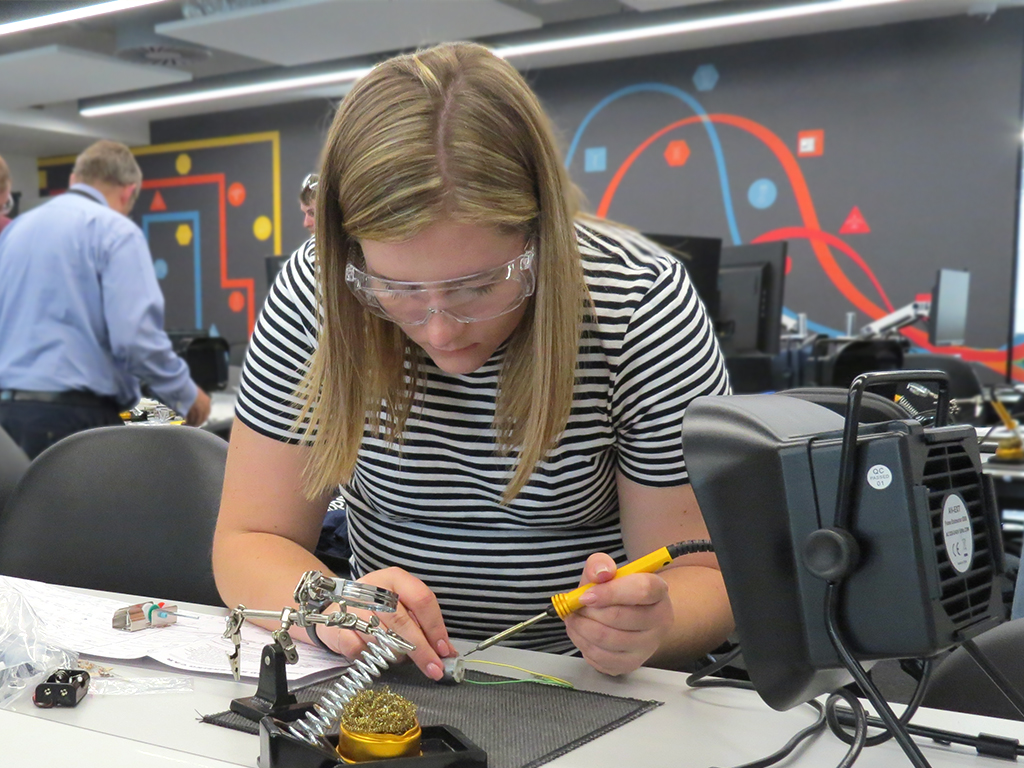
April 19, 2024, by Laura Nicholson
Degree Apprenticeships – a new way of learning (with no student loan)
Throughout the 2023–4 academic year, we are running a new feature on the Learning Technology (LT) blog: a faculty takeover month! Each month, we will feature posts from different faculty members at the university. Every Friday, posts will highlight interesting work and ideas related to technology in teaching and learning and showcase unique projects from within the various disciplines across the UoN. So far, we’ve featured content from all the faculties at the University. This month, we welcome posts from degree apprenticeship programmes at UoN.
Some of the learners at the University of Nottingham are in full-time employment while undertaking their degree studies, and their fees are paid by a “levy” rather than by the students. If you’re aware of young people who are considering their next steps after school or more mature individuals who are already employed and looking to upskill by getting a degree, then this may be relevant to them.
The University of Nottingham offers a number of degree apprenticeships:
- Electro-mechanical engineer (Level 6)
- Data scientist (Level 6)
- Architect (Level 7)
- Advanced Clinical Practitioner (Level 7)
(Level 6 is undergraduate level; level 7 is postgraduate)
Learners have a full-time role relevant to the degree with an employer and are given some “off-the-job” time to undertake their studies during their normal employment hours.
Notably, there is no direct cost to an apprentice undertaking a degree programme; fees are paid out of a “levy” pot to which all employers contribute through taxation; the employee continues to receive a salary, including during days of being released by the business to study; it is an investment by the employer in the knowledge and skills of their staff.
What does a degree apprenticeship look like?
It takes 5 years to complete a degree apprenticeship in Electro-mechanical engineering, studying a total of 20% of a typical workload; this clearly averages out at a day a week for a full-time employee. Our first cohort started in 2021 and is nearing the end of their third year.
This programme has four face-to-face weeks each year where learners come to the University of Nottingham for a week and undertake tasks including practical workshops/laboratories and teamwork challenges. Much of the remainder of their learning is remote and self-paced through resources and activities shared on Moodle.
We currently have approximately 75 learners on the electro-mechanical degree programme.
What’s the difference between studying for a degree apprenticeship and traditional study?
The main difference that a degree apprenticeship involves is the role of the employer and the workplace. Apprentices are able to put into practice what they learn directly on the programme in their day-to-day jobs, and this means that a number of the activities throughout the programme are designed to link with work-based activities, such as:
- In their first year, apprentices analyse for consistency and error a series of measurements taken in the workplace; this could be physical measurements of incoming components or performance measurements of articles on test, for example.
- In their second year, apprentices review the materials that their employer uses and consider why particular materials are used for their relevant applications.
- At various points through the programme, activities at work are evaluated for different aspects of project management, from requirement definition to planning to presenting progress and outcomes to senior management.
- The final year involves a major project, which is a deliverable that is defined by the employer.
Additionally, the employer is involved in regular reviews of their apprentice’s progress, from marks on coursework to overall progress through the degree programme. The reviews feel somewhere between a parent’s evening and a sponsor’s review of a project. Although it is different from our traditional ways of undertaking degree-level learning, there is a lot of support available to apprentices from different quarters.
Who are the apprentices?
Our apprentices on the Electro-mechanical engineering programme work for a variety of employers, from (very) small family-run firms with a handful of employees to large multinational companies, from manufacturers to engineering consultancies delivering energy solutions to public bodies and universities (we have a couple of University of Nottingham technicians on the programme). This turns out to be a strength, as there is a lot to be learned about how different employers do things, from quality control to project management to customer interaction.
While many of our apprentices are recent school leavers, starting with us in their late teens, some are considerably more experienced, with a few in their late twenties and early thirties upskilling after spending a number of years in the workplace.
About half the apprentices come through an A-level route, but with the others, there is a great variety, from BTECs to those with less formal qualifications and greater work experience.
Summary
It’s a relatively new step for the University of Nottingham to offer degree apprenticeships, particularly in engineering, but it’s proving to be a valuable link to engineering employers and an increasingly sought-after way of studying, particularly among young people. Feedback from employers and learners is that this is a valuable option, enabling people to achieve qualifications who otherwise would not have benefitted from a quality university education.
Please feel free to contact the programme team for the Electro-mechanical Engineering degree apprenticeship – Dr Rowland Travis (rowland.travis@nottingham.ac.uk) or Dr Elizabeth Bishop (elizabeth.bishop@nottingham.ac.uk).
No comments yet, fill out a comment to be the first

Leave a Reply